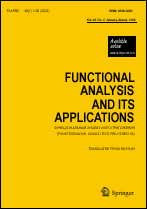|
This article is cited in 2 scientific papers (total in 3 papers)
Brief communications
The Möbius Function on Abelian Semigroups
E. A. Gorin
Moscow State Pedagogical University
Abstract:
Let $X$ be an Abelian semigroup such that the following conditions hold: (i) if $x\times y=1\mspace{-4.85mu}{\mathrm I}$ ($1\mspace{-4.85mu}{\mathrm I}$ is the identity element), then $x=y=1\mspace{-4.85mu}{\mathrm I}$; (ii) the set $\{\{x,y\}\colon x\times y=a\}$ is finite for any $a\in X$. Let $\Lambda$ be any field, and let $\mathcal{E}$ be the algebra of all $\Lambda$-valued functions on $X$. The convolution of $u,v\in\mathcal{E}$ is defined by
$$
(u*v)(x)=\sum\{u(a)v(b)\colon a\times b=x\}.
$$
We set $\varepsilon(x)=1_{\Lambda}$ for all $x\in X$. The Möbius function $\mu$ is defined as the solution of the equation $\varepsilon*\mu=\delta$ ($\delta$ is the Dirac function). The Möbius function is unique
(if it exists at all).
Some existence conditions are given. If $\Lambda$ is replaced by the
ring of integers, then $\mu$ exists if and only if $X$ does not
contain nontrivial idempotents.
Keywords:
Abelian semigroup, free module, $\zeta$-functions.
Received: 15.04.2010
Citation:
E. A. Gorin, “The Möbius Function on Abelian Semigroups”, Funktsional. Anal. i Prilozhen., 45:1 (2011), 88–93; Funct. Anal. Appl., 45:1 (2011), 73–76
Linking options:
https://www.mathnet.ru/eng/faa3027https://doi.org/10.4213/faa3027 https://www.mathnet.ru/eng/faa/v45/i1/p88
|


|




 Contact us:
Contact us: Terms of Use
Terms of Use
 Registration to the website
Registration to the website Logotypes
Logotypes








 Citation in format
Citation in format 
